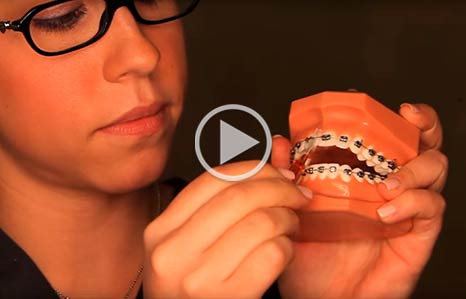Brushing and Flossing
When you have braces, it is more important than ever to brush and floss regularly so the teeth and gums are healthy during orthodontic treatment. Patients who do not keep their teeth clean may require more frequent visits to the dentist for a professional cleaning. Adults who have a history of gum disease should also see a periodontist during orthodontic treatment.
Eating with Braces
Let’s talk about what you shouldn’t eat! For the first few days after your braces are put on, stick to soft foods. Avoid tough meats, hard breads, and raw vegetables. You will need to protect your orthodontic appliances when you eat for as long as you’re wearing braces.
Foods to Avoid During Treatment
- Chewy foods: bagels, hard rolls, licorice
- Crunchy foods: popcorn, ice
- Sticky foods: caramels, gum
- Hard foods: nuts, candy
- Foods you bite into: corn on the cob, apples, carrots
Chewing on hard things (i.e. pens, pencils or fingernails) can damage the braces. Damaged braces may negatively affect the teeth and can cause treatment to take longer.
General Soreness
When you get your braces on, you may feel general soreness in your mouth and teeth for 3 – 5 days. You may take whatever medicine you normally take for a headache. The lips, cheeks and tongue may also become irritated for one to two weeks as they become accustomed to the braces. We will supply wax to put on the braces in irritated areas to ease the discomfort.
Loosening of Teeth
This is to be expected throughout treatment. Don’t worry! It’s normal. Teeth must loosen first so they can move. The teeth will firm up in their new, corrected, positions after treatment is completed.
Loose Wire or Band
Don’t be alarmed if a wire or band comes loose. This happens occasionally. If a wire sticks out and is irritating, use a blunt instrument and carefully push the irritating wire back under the archwire. Simply get it out of the way. If irritation to the lips or mouth continues, place wax or wet cotton on the wire to reduce the annoyance. Call our office as soon as possible for an appointment to check and repair the problem.
Rubber Band Wear
To successfully complete orthodontic treatment, the orthodontist may prescribe rubber band wear. This requires compliance from the patient. The teeth and jaws can only move toward their corrected positions if the patient consistently wears the rubber bands or other appliances as prescribed. Lack of cooperation following instructions can lengthen the treatment time.
Athletics
If you play sports, a mouthguard is of the utmost importance, especially during active treatment with braces. Dr. London recommends a stock mouthguard that is not molded to the teeth. This allows for protection and continued movement of your teeth by the appliances.
